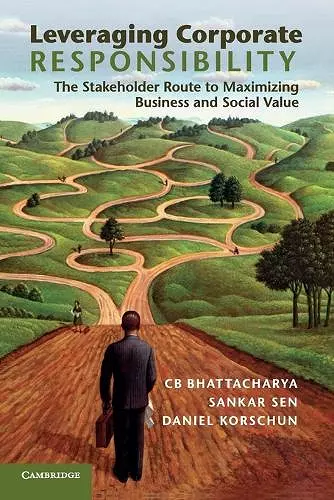Leveraging Corporate Responsibility
The Stakeholder Route to Maximizing Business and Social Value
C B Bhattacharya author Sankar Sen author Daniel Korschun author
Format:Paperback
Publisher:Cambridge University Press
Published:15th Sep '11
Currently unavailable, and unfortunately no date known when it will be back

This book shows how companies can maximize the value of their CR initiatives by fostering strong stakeholder relationships.
Almost all large corporations now run some form of corporate responsibility (CR) program. This book shows how companies can maximize the value of their CR initiatives by fostering strong stakeholder relationships to develop, implement and evaluate compelling social responsibility programs that generate value for both the company and its stakeholders.The corporate social and environmental responsibility movement, known more generally as corporate responsibility (CR), shows little sign of waning. Almost all large corporations now run some form of corporate responsibility program. Despite this widespread belief that CR can simultaneously improve societal welfare and corporate performance, most companies are largely in the dark when it comes to understanding how their stakeholders think and feel about these programs. This book argues that all companies must understand how and why stakeholders react to such information about companies and their actions. It examines the two most important stakeholder groups to companies - consumers and employees - to comprehend why, when and how they react to CR. Armed with this insight, it shows how companies can maximize the value of their CR initiatives by fostering strong stakeholder relationships to develop, implement and evaluate compelling social responsibility programs that generate value for both the company and its stakeholders.
'Leveraging Corporate Responsibility should be required reading in the global C-Suite. It identifies both the psychological levers driving stakeholder behaviour and the business responses that result in loyalty or commitment. The aim is to serve both company and society, maximizing value across the triple bottom line: people, planet and profit.' John Elkington, co-founder of SustainAbility and Volans Ventures; co-author of The Power of Unreasonable People; and originator of the triple bottom line
'Leveraging Corporate Responsibility goes beyond the conventional treatment of corporate social responsibility (CSR) to provide managers, students and scholars with a detailed, empirical analysis of the subject. Based on more than a decade of research, the book explores the complexity, uncertainty and variety of stakeholder responses to CSR initiatives. To extract maximum CSR value, the authors show why it's critical to understand who really cares about such efforts, as well as when and why they care. Focusing on customers and employees, the book reveals how to put insights into action to benefit the company and society. Anyone who cares about creating success and making a broader impact will find in these pages the tools to do both.' Dipak C. Jain, Dean, INSEAD
'This important book offers crucial new insight into a topic that, fortunately, has gained enormous traction in the corporate world. The rise of corporate responsibility - and the attendant notion that businesses can do well while also doing good - is certainly a promising trend. But its widespread acceptance inevitably has brought new challenges, as business leaders have been left to figure out how the ideas underlying CR can best be put into real-world practice. Leveraging Corporate Responsibility: The Stakeholder Route to Maximizing Business and Social Value offers a much-needed road map that will not only help executives succeed in their CR efforts, but will pay dividends for the global community as well.' Thomas S. Robertson, Dean, The Wharton School, University of Pennsylvania
'I enjoyed reading Leveraging Corporate Responsibility and picked up a few ideas for which I am grateful. Thanks to the authors for sharing. The ten years of work paid off and hopefully many will read it, as critical mass is still missing. This book helps refine our thinking about corporate responsibility.' Paul Polman, CEO, Unilever
ISBN: 9781107401525
Dimensions: 226mm x 152mm x 18mm
Weight: 460g
342 pages